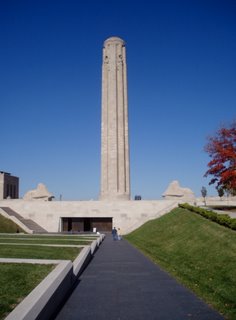 November 11, 1918-- Armistice Day. The truce that ended World War I, or as it was known in that long-ago time, the War to End All Wars. Down through the years, the date has become a federal holiday, and now is known as Veterans Day, to honor all those who have served in all of the armed services in any of America's Wars since WWI. The photo is of Kansas City's striking Peace Memorial, recently renovated and re-opened to the public. It has a new museum underneath. Originally known as "the War Memorial," it was built to commemorate WWI. At some point, Kansas Citians renamed it to honor the 20th Century's quest for peace instead.
November 11, 1918-- Armistice Day. The truce that ended World War I, or as it was known in that long-ago time, the War to End All Wars. Down through the years, the date has become a federal holiday, and now is known as Veterans Day, to honor all those who have served in all of the armed services in any of America's Wars since WWI. The photo is of Kansas City's striking Peace Memorial, recently renovated and re-opened to the public. It has a new museum underneath. Originally known as "the War Memorial," it was built to commemorate WWI. At some point, Kansas Citians renamed it to honor the 20th Century's quest for peace instead.At at time when our nation is caught between a rock and a hard place in Iraq, it might be a good time to pause and think about the sacrifices of those WWI doughboys who went to Europe and endured unimaginable wounds, mustard gas, and worse. Every time America has to go to war, personally I would hope that the exercise would leave the world a better place, in addition to securing greater security for our nation and a better climate for peace. They say that only 12 to 15 veterans of WWI are still alive, and most of them are over 100 years old. Veterans of WWII are dwindling, too. My dad, whose draft notice appeared in the mailbox the same morning I was born in 1943, has been dead for 17 years now. When I sorted through his keepsakes I found his Army field manual and several medals for expert marksmanship. An old knee injury from high school football kept him out of the Infantry, and a field surgeon sent him home to my mother and me just before his outfit left to attack Rommel in North Africa. Because he didn't see combat, he wasn't a veteran, but he was proud of his service. If he were alive today, he would be watching the televised news reports from Iraq and Afghanistan and probably would say something to the equivalent of "what are they thinking?" in regard to the political leadership, and he would be supporting the troops in their impossible mission. I can do no less than that.
What if there were a Reconciliation Commission for Iraq? The mission there today has become stabilizing the nation so that the Iraqi government can function without being overwhelmed by various factions, including insurgents and warring religious and ethnic sects. The situation might be better handled if the troops could be augmented by a proactive effort to begin to heal the wounds in that country, an effort led by the Iraqis themselves. After apartheid was ended in South Africa, a Reconciliation Commission investigated the various imprisonments and wrongs that took place and helped people find solutions that didn't involve civil warfare. Would something similar work for Iraq? Is anyone willing to try some genuine peace-keeping in addition to maintaining a security force? On this Veterans Day, former Armistice Day of the war to end all wars, it's worth a thought.

No comments:
Post a Comment